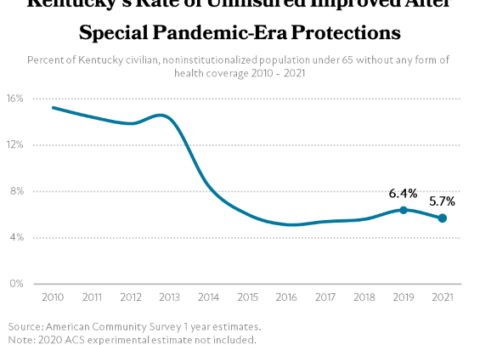Kentucky saw only slight improvements in some indicators of poverty and economic well-being last year, according to new Census Bureau data released today. Poverty remains high, highlighting that many have not yet recovered from the recession and underscoring the need to do more to help struggling Kentuckians afford basics like decent housing, reliable child care and transportation.
18.8 percent of Kentuckians lived in poverty in 2013, according to the new data. Although that is a decline from the 2012 state poverty rate of 19.4 percent, the change is not statistically significant. Poverty remains higher than the 17.3 percent rate it was in 2007 and the 15.4 percent rate of 2001.
Median household income rose 2.8 percent from 2012 to $43,399. But there was no statistically significant improvement in median earnings for workers over the last year once inflation is taken into account. And median household income is still $1,840, or 4 percent, less than it was in 2007 after inflation is factored in.
Kentucky is still struggling with the aftermath of the Great Recession. Although the state is experiencing some job growth it is still years from filling the jobs deficit caused by the recession. For many of those lucky enough to have a job, real wages are stagnant or declining, and have been for more than a decade. This makes it hard for even working Kentuckians to pay their bills and make ends meet.
“Jobs are too scarce, wages are not growing, and federal cuts to the safety net and critical programs have made the recovery slower and harder for families,” said Jason Bailey, director of the Kentucky Center for Economic Policy. “Policies that lift wages and make more investments in people can move the needle on these indicators and make our economy stronger for all of us.”
Other findings from today’s data include the following:
• 25.3 percent of children lived in poverty in Kentucky in 2013, also not a statistically significant change from 2012 and much higher than the 18.1 percent rate in 2001.
• The share of households receiving SNAP benefits declined from 18.2 percent in 2012 to 17.4 percent in 2013.
• Poverty for African Americans in Kentucky improved to 28.8 percent and median income improved as well to $29,703, but these indicators are still far worse than for whites, whose poverty rate is 17.3 percent and median income is $45,127.
Among the policy changes needed to enhance economic security is an increase in the minimum wage. As we reported in The State of Working Kentucky 2014, the erosion in the real value of the minimum wage is a big factor keeping down the wages of low- and moderate-income workers, making it increasingly difficult even for those with jobs to make ends meet. If the minimum wage had kept up with inflation since the 1960s, it would be over $10 an hour rather than $7.25. An increase in the minimum wage to $10.10 an hour would benefit more than one in four of Kentucky’s workers and 22 percent of the state’s children. The state also needs to make greater investments in education and social supports, which requires reforms to Kentucky’s tax system in order to generate the revenue to do so.
“Persistent high poverty is not an unavoidable reality, but something we can change through policy. We’ve let workers’ wages and public investments in our communities and neighbors erode over time, but with the right policies we can begin putting our state on a better path,” said Bailey.
Today’s data comes from the U.S. Census Bureau’s American Community Survey (ACS), an annual survey of demographic and economic data that the Census generally considers its best source of annual state-level poverty levels and incomes.
###

